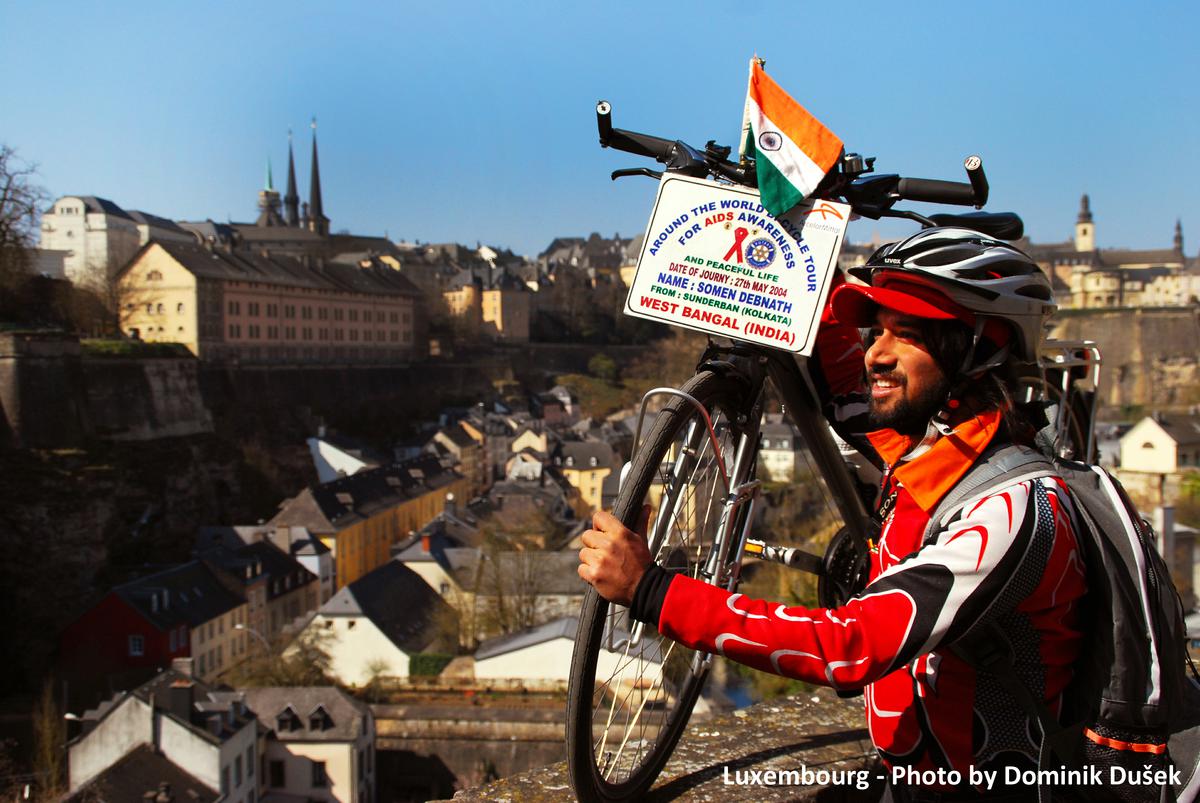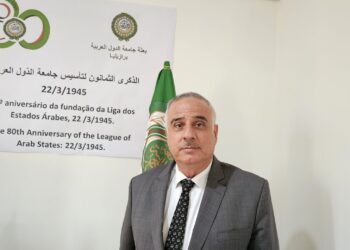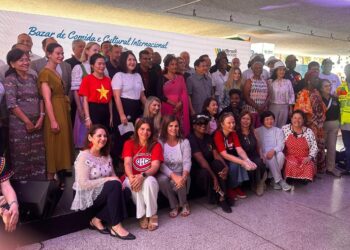[:pb]Somen Debnath visits Brasília during a world tour on bike for AIDS awareness
Oda Paula Fernandes
Activists, in the common sense, are people that fight for humanitarian causes. This definition is right when we talk about Somen Bednath, an Indian man that is 33 years old, and that, since 2004, travels around the world on a bike. The goal of this adventure is to promote the program called by him “Tour around the world for AIDS awareness”, through lectures and seminars about the subject and also about Indian culture. He predicts that the trip ends in 2020.

Sonem entered in Brazil through the Amazon. “I am enchanted with the power of the Brazilian women; they are so strong”, highlights the pilgrim. After a lecture realized in the embassy of India, in Brasília, at the last July 15, Somen will visit Belo Horizonte, São Paulo, Curitiba and Foz do Iguaçu; then, he heads toward the Patagonia.
Mission – After seeing in the news that a person have died victim of the HIV virus, Somen decided to do something in favor of the AIDS community. But this was not enough for him. Encouraged by the “good to all”, he packed his bag and with only 17 dollars – which is the amount equivalent to a McDonalds sandwich – he got the bike and started to make lectures in schools to aware children, young and adults about the importance of preventing, identifying and treating the disease. Besides that, Somen does seminars about the Indian culture.
In May 27, 2004, with the luggage weighing about 50 kilos, Somen hit the road. Since then, he have traveled more than 134 hundred kilometers, funded by persons and companies that sympathize with the cause. “I believe in destiny. I only chose the institutions where I will be doing my lectures, but destiny guides me”, says Somen.

Challenges – As for the weather conditions and altitudes, the activist said to have faced everything. “My body adapts to each situation, as going through a cold of 50 degrees negative and a heat of 50 degrees positive. Yoga allows me to change my mind and body”, says Somen. Other situations, typical of those who adventure on trips like this, is to have been arrested and stolen and even then, the humanitarian activist has not given up the goal of making more for the world.
Asked on how he have solved the problem, when he was robbed in Europe, he reveals a sublime soul elevation and says that he does not know how it is to be attached to things. Thus, he told again about the help he got from people to get a new bike, clothes and equipments such as a computer and a cellphone. “In my dictionary there is not words that describe what attachment to the material goods mean because I don’t know what [attachment] is”, he answered with friendly sympathy and respect to the question.
AIDS – According to data released this July by the World Health Organization (WHO), more than 40% of people living with HIV do not know they are infected, HIV prevention is also stagnant. In 2015, there were 2.1 million new infections, number just under 2.2 million in 2010.
According to WHO, to reduce new infections it is necessary to open discussions on the legal and social barriers that impede access to HIV treatment services. Among the new approaches to treatment and prevention of the disease, the World Health Organization draws attention to the benefits such as pre-exposure prophylaxis (PrEP) in which antiretroviral drugs are used to protect individuals at high risk of contracting the disease. Moreover, there is another study that indicates the integration of prevention efforts through sexual and reproductive health services – the most common forms of infection of HIV.
The revitalization of old strategies, that are already established and successful, is advocated by the UN health agency, which also emphasizes the importance of intensifying the promotion of condom use and maintenance of the dynamics of voluntary male circumcision. Especially in the 14 countries most affected regions of eastern and southern Africa. Currently, about 11.7 million of these procedures were performed in 2015.
Treatment – The scenario requires the Member States to guarantee access to agile and low cost testing services. This is also advocated by the United Nations agency, which highlights the benefits of self-test to expand the reach of HIV testing, especially among those who are reluctant to use health services. These program factors include treatment adherence and retention services, disruptions in the supply of antiretroviral drugs and poor quality drugs in treatment. The report also describes actions that countries should take in order to identify early and act quickly to avoid drug resistance.
Ativista indiano viaja o mundo sobre duas rodas
Somen Debnath visita Brasília durante tour mundial de bicicleta para conscientização sobre AIDS
Quando se fala em ativistas, no senso comum, são pessoas que defendem causas humanitárias. Essa definição está correta quando falamos de Somen Debnath, indiano de 33 anos, que, desde 2004, viaja ao redor do mundo de bicicleta. A finalidade dessa aventura é divulgar o programa intitulado por ele de “Tour ao redor do mundo de bicicleta para conscientização sobre HIV/AIDS”, por meio de palestras e seminários sobre o assunto, além de também fazer seminários sobre a cultura indiana. Sua previsão é de que a viagem dure até 2020.
No Brasil, Sonem entrou pelo Amazonas. “Estou encantado com o poder da mulher brasileira, da força que ela tem”, ressalta o peregrino. Após palestra realizada na embaixada da Índia, em Brasília, no último dia 15 de julho, Somen passará por Belo Horizonte, São Paulo, Curitiba, Foz do Iguaçu; depois, segue em direção a Patagônia.
Missão – Após ver no noticiário que uma pessoa havia morrido vítima do vírus HIV, Somen resolveu fazer algo em prol da comunidade. Porém, para ele, isso era pouco. Encorajado pelo “bem a todos”, ele fez as malas e com apenas 17 dólares – o equivalente a um lanche no Mcdonalds – pegou a bicicleta e saiu fazendo palestras em escolas para conscientizar crianças, jovens e adultos sobre a importância de prevenir, identificar e tratar a doença. Somen também faz seminários sobre a cultura Indiana.
Em 27 de maio de 2004, com bagagem pesando cerca de 50 kg, Somen pegou a estrada. Desde então, mais de 134 mil quilômetros foram percorridos, financiados por pessoas e empresas que simpatizam com a causa. “Eu acredito no destino. Só escolho as instituições onde vou fazer minhas palestras, mas o destino me guia”, diz Somen.
Apesar da distância, Somen diz não estar sozinho na estrada porque carrega (nas pulseiras e colares expostos nos braços e pescoço) a alma de pessoas com quem já esteve e que não podem viajar o mundo. “Isso representa a alma de pessoas que não podem viajar o mundo, então eu as carrego, assim as almas delas podem viajar o mundo, como eu. Estamos sempre juntos”, relata com carinho.
Desafios – Quanto às condições climáticas e altitudes, o ativista diz ter enfrentado de tudo. “Meu corpo se adapta a cada situação, como passar por frio de 50 graus negativos para um calor de 50 graus positivos. A ioga me proporciona mudar meu corpo e mente”, revela Somen. Outras situações, típicas de quem se aventura em viagens como esta, é a de sido preso e roubado; mesmo assim, o ativista humanitário não desistiu do objetivo de fazer mais pelo mundo.
Questionado sobre como resolveu o problema, depois de ter sido roubado na Europa, ele revela sublime elevação da alma e diz que desconhece o “apego” as coisas. Assim, ele contou novamente com ajuda das pessoas para adquirir outra bicicleta, outras roupas e equipamentos como computador e celular. “No meu dicionário não tem palavras que descrevam o que significa o desapego aos bens materiais porque eu não sei o que é isso”, respondeu com amistosa simpatia e respeito à pergunta.
AIDS – Segundo dados divulgados neste mês de julho pela Organização Mundial da Saúde (OMS), mais de 40% das pessoas que vivem com HIV não sabem que estão infectadas e a prevenção do vírus também está estagnada. Em 2015 foram registrados 2,1 milhões de novas infecções, número pouco abaixo dos 2,2 milhões de 2010.
No entendimento da OMS, para reduzir novas infecções é necessário abrir discussões sobre as barreiras legais e sociais que impedem o acesso aos serviços de tratamento do HIV. Entre as novas abordagens de tratamento e prevenção da doença, a Organização Mundial chama a atenção para os benefícios como a profilaxia pré-exposição (PrEP) em que as drogas antirretrovirais são usadas para proteger indivíduos com elevado risco de contrair a doença. Além disso, há outro estudo que indica a integração de iniciativas de prevenção por meio dos serviços de saúde sexual e reprodutiva – as formas mais comuns de infecção do vírus do HIV.
A revitalização de antigas estratégias já consolidadas e bem-sucedidas é defendida pela agência de saúde da ONU, que ressalta ainda a importância de intensificar a promoção do uso de preservativos e a manutenção da dinâmica de circuncisão masculina voluntária principalmente nos 14 países mais afetados das regiões leste e sul da África. Atualmente, cerca de 11,7 milhões de procedimentos como esse foram realizados em 2015.
Tratamento – O cenário exige dos Estados-Membros a garantia ao acesso a serviços de testagem ágeis e de baixo custo. Este procedimento é defendido também pela Agência das Nações Unidas, que ressalta os benefícios do autoteste para ampliar o alcance de exames de HIV, principalmente entre os que relutam a usar serviços de saúde.
Esses fatores do programa incluem adesão ao tratamento e retenção nos serviços, interrupções no fornecimento de medicamentos antirretrovirais e má qualidade nos serviços de tratamento. O relatório descreve ainda ações que os países devem tomar a fim de identificar precocemente e agir rapidamente para evitar a resistência aos medicamentos.














